By Keolanani Kinghorn
At On Pitch Performing Arts, welcome to the fictional town of Tuna, Texas, the “third-smallest” town in the state, Greater Tuna, created by writers Jaston Williams, Ed Howard, and Joe Sears centers around the citizens of this small town, and what it’s like to live in this goofy place. Radio Station OKOK is constantly played in everyone’s homes, creating an echo chamber of sorts. Greater Tuna was written in 1981, but its themes are more pertinent than ever. A hilarious satire and commentary on small-town life, Southern life and attitudes, you’ll find yourself laughing and maybe cringing a bit because Greater Tuna shows us a hilarious side of ourselves.
Brandon Stauffer and Dan Tate play 21 characters in just over 90 minutes, and we see many of these characters several times, which means that Stauffer and Tate are constantly changing costumes and accents. Costume Designer Stacey Haslam, Stage Manager Daniel Cook, and Costume Run Crew Teresa Howell should be considers stars of this show because their ability to create a seamless flow with costume changing is a sight to behold. Director Rachel Helwig commented that the show is a “tour de force to be sure.” She says, “I’m flattered I was asked to be a part of the fun.” To Brandon and Dan: “I’m in awe of your comic chops and camaraderie and the ease with which you play off each other onstage.” There are so many stories and side plots happening in Greater Tuna while dealing with some complex issues, not to mention a lot of imaginary dogs. But somehow Stauffer and Tate took me with them on their journey with comedic ease. These two men nailed it. Some costume changes were only seconds long. I was not worried about any themes or transitions during those ninety minutes, but just relaxed into the ease of small-town life, picturing those yapping dogs.
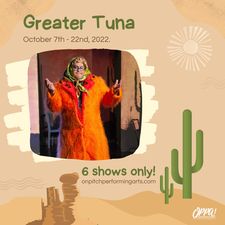
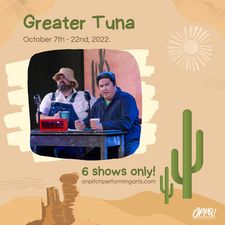
The set was painted by Carole Taylor and sound designed by Josh Rice and both give this production such a great technical aspect. This play was OPPA!’s first official production their new Creator’s Stage, a smaller stage adjacent to their main stage that allows OPPA to hold several more productions every season. Funding for the Creator’s Stage comes from generous members of their Creator’s Club.
Stauffer is a comedic genius in a dress, especially in the second half of the play when he delights the audience performing a song to a corpse at a funeral. And Tate impressed me with his range of accents and voice changes. My favorite was from a character named Petey Fisk, a dedicated employee of Tuna’s Humane Society, who speaks with an adorable lisp. Another standout character of Tate’s was Charlene Bumiller, a depressed and over-weight daughter of a prominent family in Tuna whose only goal in life is to be a cheerleader (but she doesn’t make the team). At the end of Greater Tuna, Charlene recites a poignant poem about her beloved hometown, saying that even Rome can’t compare and continues, “But Tuna, Oh my Tuna, just stay the way you are because I think everywhere else is just bizarre.” Writing down every character that both Stauffer and Tate played, I was impressed again and again how they are able to switch between these people so quickly. They have obviously spent time developing these characters, understanding them and their motivations. But let’s take it a step further. These two men switch between so many characters, they display the mark of a great actor: they make it look easy.
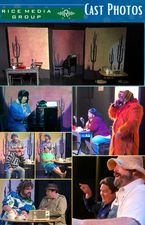
Characters played by Tate:
- Charlene Bumiller: Daughter of Hank and Bertha Bumiller, and sister to Stanley and Jody.
- Jody Bumiller: Youngest child of Bertha Bumiller, followed constantly by “eight to ten dogs”.
- Stanley Bumiller: Fresh from reform school; Brother of Charlene and Jody.
- Vera Carp: Town snob and vice president of the Smut-Snatchers of the New Order.
- Petey Fisk: Employee of the Greater Tuna Humane Society.
- Didi Snavely: Owner of Didi’s Used Weapons (“If we can’t kill it, it’s immortal”).
- Arles Struvie: A disc jockey at radio station OKOK.
- Chad Hartford: A reporter from Houston who comes to interview Bertha.
- Phinas Blye: A politician from Indiana who runs for City Council every election.
- Harold Dean Lattimer: OKOK’s weatherman.
Characters played by Stauffer:
- Bertha Bumiller: Wife of Hank and mother to Jody, Stanley, and Charlene; member of the Smut Snatchers of the New Order.
- Hank Bumiller: Husband of Bertha.
- Pearl Burras: Aunt to Bertha, who is, as Petey Fisk claims, addicted to killing dogs (in the play, called “canicidalthumbitus”).
- Leonard Childers: Station Manager of OKOK for his talk show, “Leonard on the Line.”
- Sheriff Givens: Believes in old-fashioned jails.
- Elmer Watkins: Head of the local chapter of the KKK, dedicated to making the town safe “or the right kind of people”.
- Yippy the dog: Yips a lot so no one wants to adopt him, except Jody.
- R.R. Snavely: UFOlogist, town drunk, and husband to Didi.
- The Reverend Spikes: President of the Smut Snatchers of the New Order.
- Thurston Wheelis: Disc jockey at radio station OKOK.
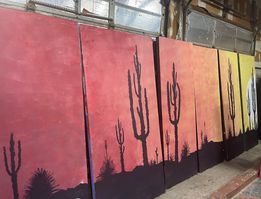
What I really love about Greater Tuna is it blends comedy and serious themes all wrapped into one hilarious production. I thoroughly enjoyed the show and laughed the entire time, but I will also mentally chew on its themes and messages for days. The fact that it was written in 1981, and here we are in 2022 and still dealing with racist ideals shows the value and relevance of Greater Tuna. Why are small towns with echo chambers like Tuna, Texas still the same in 2022? It has been more than 40 years since this play was written. Why haven’t things changed more? How do we cherish our history while still moving forward with respect for every individual? These are the conversations I hope Greater Tuna stirs beyond the laughs.
There’s nothing fishy about Greater Tuna, just lots of fun, and thought-provoking ideas. Go see it while you still “can”.
This show is recommended for teens and up.
On Pitch Performing Arts presents Greater Tuna, by Jaston Williams, Ed Howard, and Joe Sears.
On Pitch Performing Arts, 587 N Main St., Layton, UT 84041
October 8, 14-15, 21-22, 2022 7:30 PM
Tickets: $12, Tickets are purchased online. Free Parking
Contact: Call 385-209-1557, info@onpitchperformingarts.com
On Pitch Performing Arts Facebook Page
Greater Tuna Facebook Event
“The Secret History of Tuna” by Robert Faires
It all started in Austin, TX. Robert Faires from the Austin Chronicle (printed in 2002) explains:
It was here that Sears and Williams gave birth to the first play in the trilogy, and they might not have done that had it not been for the curious blend of individuals and circumstances at the time. This was in the pre-dot-com bust, pre-dot-com boom, pre-real-estate bust, pre-real-estate boom in Austin of the early 1980s, and professional theatre was still little more than a hopeful gleam in the eyes of local actors. But there was a noble experiment being undertaken in that vein, and Joe Sears and Jaston Williams were a part of it. The experiment was called Xenia III Productions, and it was an attempt to create a theatre with a permanent company of salaried artists. This one started with capital from a group of private investors, enough to renovate a crumbling old Sixth Street moviehouse and start paying seven artists “somewhere between $150 and $200 per week.”
So it was that in the fall of 1980, Sears and Williams, friends since meeting in a theatre company in San Antonio in 1973, joined forces with C.K. McFarland, Terry Galloway, Ed Howard, Adrienne Braswell, and Joy Cunningham.
In a theatre they dubbed the Trans/Act, these creative adventurers announced their arrival in Austin with a project that scooped Disney by a decade and a half: a musical adaptation of The Hunchback of Notre Dame. Alas, their take on Quasimodo didn’t enjoy the success of the one from the House of Mouse. It became Xenia III’s first and last production. The private funding, which was reportedly guaranteed for five years was cut off, and the company was dissolved. That was how Williams and Sears found themselves without gainful employment in Austin in the summer of 1981.
Now around that time, they had been asked to provide entertainment for a friend’s party. It being Morning in America, with Ronnie leading the charge against the Evil Empire, and Austin being a liberal outpost in a conservative frontier and they being liberals with a taste for satire, they opted to use the opportunity to smite the Right. Drawing on their mutual histories in little Western towns, they delivered dispatches from a reactionary radio station in some Panhandle paradise for the profoundly conservative. When their little broadcast from station “OKOK” (KKK in original text) proved enormously popular, they decided to develop it into a play. After all, what else were they going to do? They started getting together at Barton Springs, swimming for half an hour, then improvising into a tape recorder. Their friend Ed Howard collaborated on the script, directed the two actors, and drained his savings account for the $10,000 to mount the production.
Faires said that Sears and Williams “brought Austin [Texas] new words, new stories that made us laugh, made us think, and if their careers can be summed up as two men and a town, you can just as easily say the town is ours.” In a sense, the writers of Greater Tuna helped redefine a part of Texas, to change the narrative surrounding Texans to show that there are Texans who are not giving into the echo chambers around them, and proved that there are other options than the final words of their play: “If you find somewhere you like better than Tuna, move!”

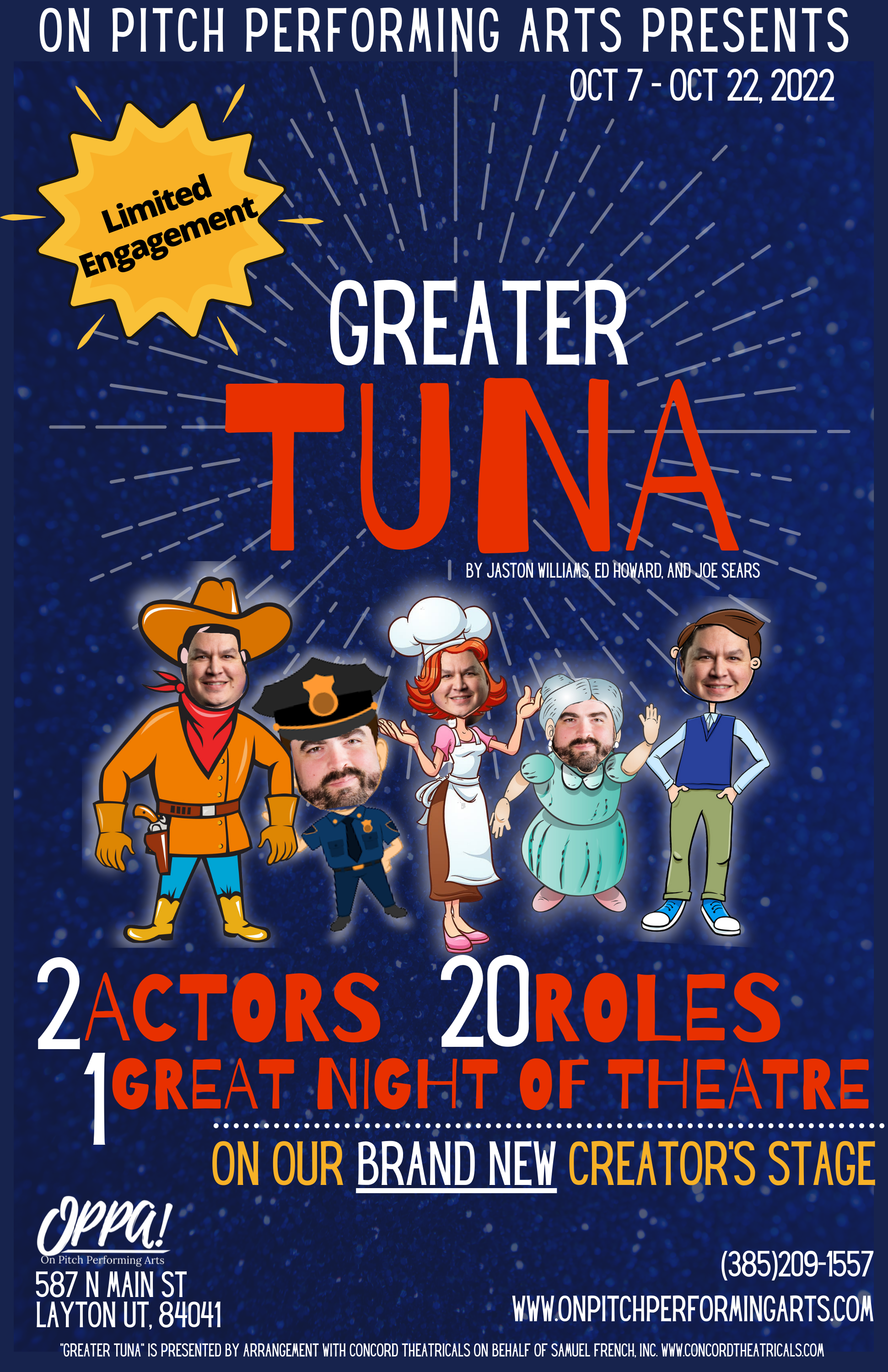
0 Comments